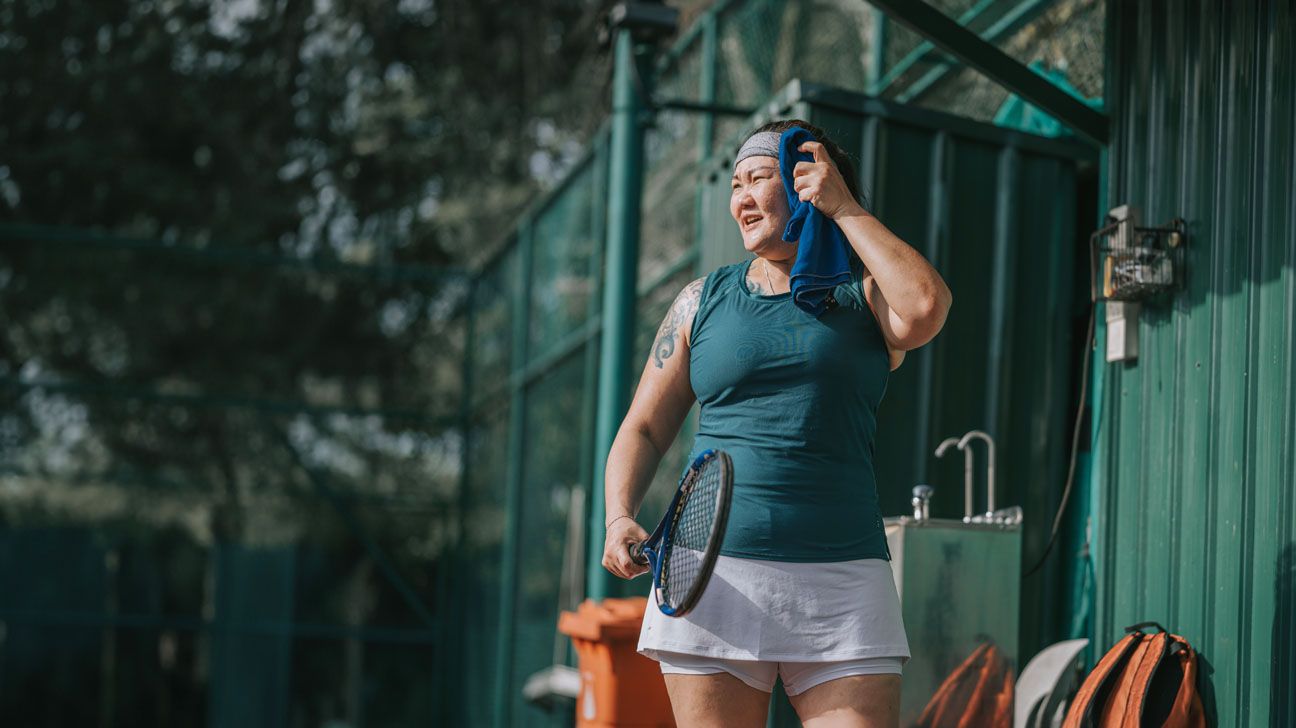
- Experts say people who take GLP-1 weight loss medications should stay hydrated, particularly when temperatures are high.
- The mechanisms of GLP-1 drugs that help reduce appetite, as well as their side effects, may lead to dehydration.
- Dehydration can cause symptoms such as dizziness and a dry throat, as well as potentially lead to cramps and even seizures.
Dehydration could be a potential side effect of taking GLP-1 medications like Ozempic and Mounjaro.
Experts say dehydration can easily occur as people lose weight with GLP-1 drugs, as their hunger and thirst impulses are tamped down by these medications.
“Dehydration is a serious risk when taking GLP-1 medications,” Kais Rona, MD, a bariatric surgeon of MemorialCare Surgical Weight Loss Center at Orange Coast Medical Center in California, told Healthline.
“A reduction in hunger drive may be associated with a reduction in thirst drive as well. Patients can develop dehydration rather quickly while taking these medications.”
Rona and other experts emphasize that dehydration is not a direct result of taking the GLP-1 drugs.
Rather, dehydration develops because of the medication’s mechanisms to lower the body’s desire for food and consequently liquids. Here’s what you need to know about staying hydrated while taking GLP-1 drugs, particularly during rising temperatures.
Common side effects from GLP-1 drugs, such as nausea, vomiting, and diarrhea, can exacerbate dehydration.
“These medications work by reducing appetite and slowing down gut function, which not only result in a reduction in food intake, but a reduction in fluid intake as well,” Rona explained.
“Furthermore, the most common side effects associated with GLP-1 medications are gastrointestinal symptoms such as nausea, constipation, and vomiting.” These symptoms, he added, may exacerbate dehydration.
“They can also increase the risk of nausea, vomiting, diarrhea, constipation, and other GI side effects — all of which can be made worse by dehydration.”
Jessica Crandall Snyder, a registered dietitian and a medical advisor to FuturHealth, noted the issue is even more important in warmer weather.
“GLP-1s can interfere with your body’s natural hunger and thirst cues, meaning you might not feel thirsty even when your body needs fluids,” she told Healthline. “They may also impact thermoregulation, making it harder for the body to cool itself effectively. In hot weather, that could increase the risk of overheating or even heat-related illness.”
Zhaoping Li, MD, a professor of clinical medicine and the chief of the Division of Clinical Nutrition at the University of California Los Angeles, said GLP-1 drugs can also cause people to urinate more often. That can also lead to dehydration. “You need to be careful,” Li told Healthline.
Dehydration occurs when the body doesn’t adequately replace the fluids it loses when sweating and urinating.
You can also become low on fluids if you have an illness, especially one that causes fever.
People who are more likely to become dehydrated include:
- athletes
- older adults
- people working in hot weather
- infants and young children
- people with chronic conditions
- people who live at high altitudes
The symptoms of dehydration include:
- increased thirst
- dry mouth
- fatigue
- dizziness
- dry skin
- headache
In more serious cases, dehydration can cause a rapid heart beat and rapid breathing. Li said a person who is dehydrated may also develop low blood pressure.
“In addition, as you urinate, you can lose calcium, potassium, and salt,” she said.
Rona said there are a variety of serious ailments that can also be produced by dehydration.
“Dehydration can result in significant electrolyte abnormalities, which may present as vague symptoms such as confusion, decrease in energy levels, fatigue, or muscle spasms,” he said.
“Inadequate hydration can also worsen constipation, which is a common side effect of the medication. Lastly, severe dehydration can lead to blood pressure abnormalities as well as kidney injury, which can sometimes result in permanent kidney damage if not addressed urgently.”
On their website, officials at Reviv Lounge, a weight loss treatment center in Wisconsin, discuss the importance of hydration while taking GLP-1 medications.
“Water is essential for nearly every function in your body, but it plays a particularly crucial role when you’re actively trying to lose weight,” they say. They also note that when the body is low on fluids, it can hold onto excessive sodium, which can cause bloating and water retention.
Staying hydrated is key to maintaining overall health. A 2023 study concluded that hydration can also help with healthy aging.
In general, it’s recommended that males drink 13 cups of water per day and women drink nine cups of water per day.
Experts interviewed by Healthline agreed it’s important to stay hydrated while taking weight loss medications.
“It is very important to prioritize hydration when taking a GLP-1 medication,” said Rona.
“Water with or without natural flavors and electrolyte-based fluids are the preferred sources of hydration. It is important to reduce the intake of sugary beverages as well as carbonated beverages, which can sometimes exacerbate the gastrointestinal side effects of the medication,” he added.
“It is critical to know your hydration needs and keep track of your intake,” Michael Snyder noted. “This is the same as we recommend for anyone following a dietary regimen, but more so if you are on GLP-1 medications, since they can notably affect hydration status.”
Jessica Crandell Snyder shared some practical advice for people taking GLP-1 medications.
“Start with a comprehensive plan, not just the medication. Stay hydrated and drink electrolyte-rich fluids if you’re experiencing GI symptoms,” she said.
“If you are nauseated, take small, frequent sips of cold beverages. Continue to prioritize high protein meals and stay in close communication with your healthcare provider, especially in the early weeks or if digestive symptoms persist. GLP-1s are powerful tools, but they’re most effective when supported by lifestyle shifts,” she recommended.
Ozempic, Rybelsus, and Wegovy contain the active ingredient semaglutide. Ozempic and Rybelsus are used for type 2 diabetes. While Ozempic is often prescribed off-label for weight loss, Wegovy is approved by the FDA for weight loss.
Mounjaro and Zepbound contain the active ingredient tirzepatide. Mounjaro has been approved to treat type 2 diabetes, while Zepbound has been approved by the Food and Drug Administration (FDA) for weight loss.
In the past three years, numerous studies have lauded the weight loss benefits of GLP-1 drugs. In addition, researchers have reported that GLP-1 drugs can help:
However, these GLP-1 drugs can produce side effects. Among them:
- nausea and vomiting
- diarrhea
- constipation
- abdominal pain
- indigestion
Li said it’s important to drink plenty of fluids and consume enough protein when taking GLP-1 drugs. In fact, a recent study reported that protein can help prevent muscle loss caused by GLP-1 drugs.
“They are plenty of reasons for people to take weight loss medications, but you need to be careful,” Li said.

